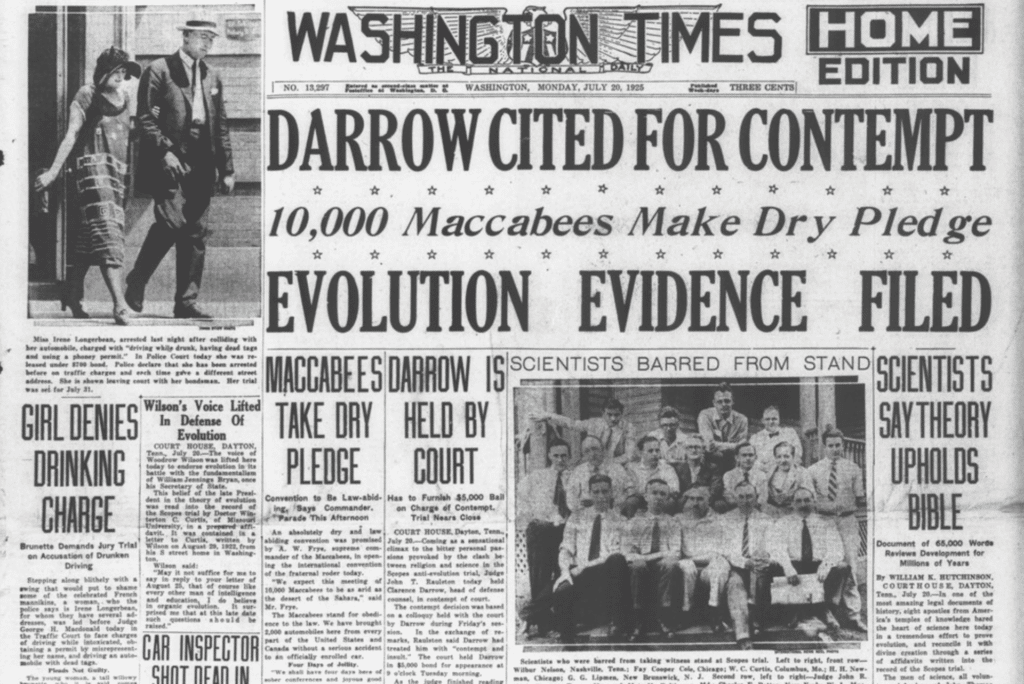American children deserve to be educated about the climate crisis
By John Morales | June 23, 2022
 The Scopes trial over teaching evolution in schools made headlines across the United States. (Image: Lib. of Congress)
The Scopes trial over teaching evolution in schools made headlines across the United States. (Image: Lib. of Congress)
American society evolves. Or does it? Nearly 100 years after the Scopes “monkey trial” pitted evolution against creationism, science in schools is still in the crosshairs, particularly the science of climate change. In the 1925 State of Tennessee v. John Thomas Scopes case, a public-school substitute teacher was prosecuted for breaking the newly passed Anti-Evolution Act, which made it a crime “to teach any theory that denies the story of the Divine Creation of man as taught in the Bible and to teach instead that man has descended from a lower order of animals.” The statute was the first of its kind. Tennessee legislators acquiesced to church leaders who espoused a strict interpretation of the bible and frequently spoke out against the threat they saw in Darwinism.
The devout fundamentalist and three-time populist presidential candidate William Jennings Bryan, who believed that teaching children about evolution would threaten the nation’s moral compass, agreed to prosecute the case. The trial was a movie-worthy spectacle, immortalized in the 1960 Hollywood film Inherit the Wind, and although Bryan emerged bruised, he was ultimately successful. Scopes was convicted by a jury of violating the Anti-Evolution Act.
Other states followed Tennessee’s example. Amazingly, it took until 1987 for the US Supreme Court to strike down all laws banning the teaching of evolution because they represented an unconstitutional promotion of religion.
Today, though, fundamentalism has taken on a new form.
The Florida Department of Education recently rejected 54 math textbooks—yes, math—because they alluded to “prohibited subjects,” including climate change, social-emotional learning (which conservatives say is a gateway to liberalism), and critical race theory. How so? In one case, the caption for a bar graph describes how data “measures levels of racial prejudice.” Even the notion that racism may still exist in the United States is considered off-limits in Florida.
This is attention-grabbing enough and clearly a case of fanning the flames of present-era conservatism by Florida Governor Ron DeSantis, who likely has presidential aspirations. I say “clearly” because the state’s Department of Education has no direct say in which textbooks get approved or banned—local school districts do. Therefore, there’s little significance in the state’s entire review process other than making headlines.
But what also caught my eye was this comment from a reviewer who rejected a textbook called Mathematics for College Liberal Arts for “talking about a climate crisis as if it’s a proven fact.” She pointed to an exercise in which “you can tell” that the textbook “favors Al Gore and dislikes Rush Limbaugh” in “an argument” about climate change.
In many school districts across the country, it’s typical for just a handful of individuals to have the power to discard facts in the physical and social sciences if they don’t align with their worldview. Just as teaching Darwinian evolution was banned for decades and American history has been whitewashed in schools today, anthropogenic climate change is often labeled as too controversial to be taught properly in some of the most populous states in the country.
According to a study published in 2020 by the National Center for Science Education and the Texas Freedom Network Education Fund, 10 states received deficient or failing grades (Ds and Fs) for their standards in educating about climate change, four of them among the top 10 most populous states in the United States: Florida (D), Ohio (D), Texas (F), and Pennsylvania (F). Excepting the Keystone State, every other northeastern state received A or B grades, as did the West Coast states. The South scored poorly, with Alabama, Georgia, and Virginia all receiving failing grades. As journalist and author Katie Worth highlights in her recent book Miseducation: How Climate Change is Taught in America, the pattern suggests that there is a red-blue political divide between states that properly teach climate science and those seeking to water the science down.
Whether Florida’s state-level textbook reviews will have any effect at the school district level remains to be seen. But because the federal government is mostly hands-off in terms of pedagogy, textbook publishers must contend with fifty powerful departments of education and effectively hundreds of local districts. It may be easier for them to cater to the lowest common denominator.
When climate change isn’t properly taught, students aren’t the only ones impacted. Parents are affected, too. A study of middle school children in North Carolina found that parents grew more concerned about the climate crisis after their children were taught about it. This intergenerational effect played out most strongly in conservative families. Daughters were especially influential, and fathers were especially influenced.
It’s important to note that people aligning on the political right aren’t the only ones with blinders on. Despite a lack of scientific evidence, unfounded fears about genetically modified crops and vaccines are held by people across the political spectrum. The scientific community has, so far, struggled to counter this type of confusion, which can lead to hostility towards life-saving genetic and medical advances.
When it comes to acceptance or “belief” in climate change, opinion surveys have found that people’s answers may say more about their values and social identity than about their actual knowledge of climate science. Like the theory of evolution, pre-existing worldviews as well as commitments to religious and social groups can interfere with a person’s understanding of climate science.
We are, therefore, in a positive feedback loop that perpetuates climate inaction. Politicians and parents in lockstep with their convictions pressure school districts to not teach the state of the science of climate change—that it’s real, it’s us, it’s bad, and there’s hope. Fewer students attain a thorough understanding of the climate threat, and fewer still talk to their parents and extended family about it. Students stay uninformed and parents remain misinformed.
In contrast, young people who are taught about the climate crisis have proven capable of leading by example. Researchers at San Jose State University followed students who had taken an intensive college course on climate change and found they made more environmentally-friendly decisions than their peers for years afterwards. These decisions—what car to buy; what foods to eat; how to dispose of waste—added up to 2.86 tons less carbon dioxide emissions per student per year.
There are people and organizations trying to correct course. The National Center for Science Education asks that states reflect the scientific consensus on climate change in their state science standards. The Next Generation Science Standards, based on the collective guidance from the National Research Council, the National Science Teaching Association, and the American Association of the Advancement of Science, among others, were used to formulate teaching standards in 20 states and the District of Columbia. That takes care of 36 percent of public-school students in the country—but what about the other 64 percent?
It may take time, but I think there’s a good chance for a robust climate curriculum to expand to the rest of the country. Up to now, the so-called adults in many school district board rooms have appeared so uncaring that they are willing to sacrifice their children and grandchildren’s futures. But as the climate crisis deepens, more Americans are internalizing the threat. Four in seven are now, at minimum, concerned about global warming. The number of those alarmed by the rapidly changing climate is up to 33 percent.
Redoubled efforts to properly educate on the state of the science of climate change, and solutions to the crisis, will outlast national moods and political swings. As the National Center for Science Education deputy director Glenn Branch wrote in the Bulletin over five years ago, “effective action on climate change is necessarily going to be a long-term—multigenerational—project.” Over time, younger generations can only benefit from this education. And they may just save the planet.
Together, we make the world safer.
The Bulletin elevates expert voices above the noise. But as an independent nonprofit organization, our operations depend on the support of readers like you. Help us continue to deliver quality journalism that holds leaders accountable. Your support of our work at any level is important. In return, we promise our coverage will be understandable, influential, vigilant, solution-oriented, and fair-minded. Together we can make a difference.
















A very good resource for climate change is the book “The Wizard and the Prophet” by Charles C. Mann –
https://www.goodreads.com/book/show/34959327-the-wizard-and-the-prophet
Here is a video lecture by the author covering what is in the book –
https://longnow.org/seminars/02018/jan/22/wizard-and-prophet/
Climate change education? a good idea. Half a century of research points out over an over that your zip code determines your education in public schools. States now must pay private religious schools if they are paying private schools.
This will make teaching Christian morals, the right and good in America, and leave out pesky things like high mathematical theory, or history that includes slavery, or the US part in nuclear proliferation. Hyper local taxation for public schools will keep the poor folks in their place.
Global warming awareness, and protesting/organizing/path to less pollution– that is forbidden